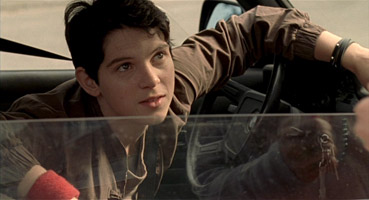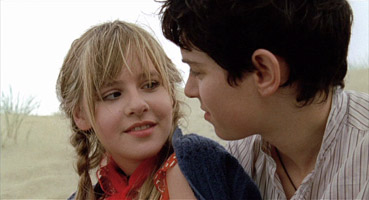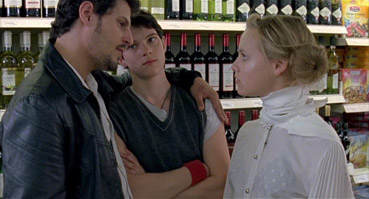|
It must be frustrating when you want to tell a story that doesn't conform to the mainstream norm and it bears even a passing resemblance to one that has been told before, particularly if that predecessor was financially or critically successful. For some reason, it has been deemed that if you want to tell an unconventional tale or tell in an unorthodox manner, then it's first come, first served, and all subsequent films are essentially classed as rip-offs. Sometimes such criticism is justified of course – Hollywood regularly feeds off of the creativity of independent and non-American cinema – but as Gasper Noe's brilliant but punishing Irreversible ably demonstrated, just because you've chosen to tell your tale in reverse, it doesn't mean you're trying to copy Christopher Nolan's Memento. But check how many on-line reviews quote Nolan's film when discussing Noe's. Mine did. So did just about every other one I've read. Nolan got there first, and in movies at least, an original idea only gets to be used once before it gets labeled old-hat.
Nan Neul's 2008 My Friend from Faro [Mein Freund aus Faro] certainly risks being clobbered in this respect through its resemblance to an acclaimed and Oscar-winning American indie film from 1999. I could try to avoid revealing just what that film is but there's not much point, given that the comparison is plastered on the DVD cover in a quote that also gives you an idea how Neul's film ends (a little misleadingly, as it happens). Yep, when your telling the story of a transgender girl whose girlfriend believes she is dating a boy, all roads inevitably lead to Kimberly Peirce's Boys Don't Cry. But despite some strong similarities, there are also enough differences to give Neul's film its own distinct identity and prevent it from languishing in its predecessor's shadow.

Mel is a 22-year-old girl who dresses and acts like an 18-year-old boy. When driving one night she literally runs into Jenny, a young girl who is hitchhiking to town with her sister Bianca. She's actually not injured, having faked her impact with Mel's car to collar a lift from its concerned driver. Mel is instantly and unexpectedly entranced by Jenny's beauty and accompanies the girls to their nightclub destination. Mel and Jenny strike up a friendship that quickly develops into something more, but Jenny is under the impression that girl she is falling for is a boy named Miguel who hails from the Portuguese town of Faro.
Complicated? You don't know the half of it. Mel's false cultural identity has not been randomly chosen, but influenced by her new Portuguese co-worker Nuno, with whom she has become fascinated but who pays her scant attention. At home with her craggy father Willi and her older brother Knut, Mel is the altogether more feminine Melanie. Knut has been pushing her to find a boyfriend, and on the day Mel meets Jenny he prods her again, primarily so that he and she can double-date at a dinner that he's throwing for his girlfriend Vicky. Much to his surprise, Mel claims that she already has a boyfriend. They met, she tells him, when she accidently bumped him with her car the night before – his name is Miguel and he's from Faro in Portugal. Now it's complicated. But there's more. To give substance to the lie, Mel approaches Nuno and hires him to play her boyfriend Miguel for an evening, which also provides her with someone to claim she is out with when she nips off to see Jenny. Jenny, of course, thinks she's Miguel. Still with me?
What may sound convoluted unfolds with crystal clarity in the film itself. What is not so clear in the early stages is how we are supposed to perceive Mel's assumed gender and at what point we are expected to realise that he is a she. In her work uniform she certainly looks like a teenage boy and her colleagues appear to treat her as such, and when she first approaches Nuno in her street clothes outside she retains her boyish mannerisms and a convincing degree of upper body bulk. But the telltale signs that we're looking at a woman dressed up as a man are by then starting to show, from moments of facial femininity to a chest that few would mistake for well developed pecs. Certainly, there is no direct confirmation until the night of the double-date dinner, when Mel's clothes and hairstyle mark her as unmistakably female. Then again, I wondered how much I was influenced by knowing in advance the basics of the story, something the promotional material makes no attempt to hide.

Selling female as male is never easy, but actress Anjorka Strechel does an excellent job, convincingly switching genders with the ease of a chameleonic student at Dr. Xavier's School for Gifted Youngsters. For much of the time she utterly convinces as a teenage boy, and it's here that you completely buy in to Jenny's attraction and willingly suspend disbelief at the signs that do show. It's a performance that goes way beyond the mechanics of gender division. Stretchel makes every emotion – from loving gazes to inner turmoil – hit home without ever overplaying her hand. Her restraint here goes hand-in-hand with her gender deception, giving us full access to her inner feelings in moments of contemplative solitude or in the revealing intimacy of the cinematic close-up.
That Jenny is clearly a lot younger than she dresses and behaves also moves this offbeat love affair into the realms of social taboo. Surprisingly, perhaps, it never plays that way, unfolding instead as a coming-of-age story more focussed on its emotional effect than the potential complications of sex. The narrative similarities to Boys Don't Cry are impossible to ignore, but first time feature director Neul takes all of the key borrowings down a notch, resulting in a somewhat less harrowing journey for her lovelorn protagonist and a correspondingly less punishing one for the audience. For some this will leave My Friend from Faro looking like Boys Don't Cry-lite, lacking as it does the intensity, terror and emotional thump of Peirce's true story-inspired drama. But in its own rather sweet and unassuming way, Neul's confident, well acted and technically assured film is equally worthy of your attention, a work that touchingly captures the confusion and sometimes reckless impulsiveness that comes with being young and in love.
A clean, attractive 1.85:1 anamorphic transfer that displays an impressive level of detail, particularly for a film that was apparently shot on 16mm and blown up to 35mm. That pleasing, pastel leaning colour palette you get with some 16mm stocks is evident here and has not been excessively tweaked in post-production. The contrast range is also nicely judged, being punchy without losing detail to the black levels or burning out whites. There is some grain visible, but it's surprisingly light given the 16mm source.

Dolby 2.0 stereo and Dolby 5.1 surround tracks are on offer here, both in the original German. Initially it seems like the surround track has a real edge, being louder and sonically brighter than the stereo, but stay with it for a while and you'll soon realise that this is not a true 5.1 mix but an AC-3 recoding of the stereo track, which is why some of the dialogue plays simultaneously from both the front and rear speakers, wherever the person who is talking is standing. Thus I'd turn up the volume and go with the correctly mixed stereo track, which is clear, well balanced and displays some distinct separation on effects and music.
Interview with Actress Anjorka Strechel (10:00)
The unmistakably female Stretchel (which makes her transformation seem all the more remarkable) talks about landing the role of Mel, playing a dual gender character, working with director Neul and the then 13-year-old Lucie Hollmann (who plays Jenny), her subsequent film projects, and more. It comes as no surprise that she prepared for the role by extensively studying the way boys move and carry themselves (this really shows in her performance) – what did catch me out was director Neul's insistence that she particularly study Leonardo de Caprio in Titanic.
Behind the Scenes Gallery (1:59)
A rolling gallery set to music of 26 behind-the-scenes stills, including several of director Neul working with the cast, all framed as grubby-edged polaroids.
My Friend From Faro Trailer (1:49)
Well enough assembled, but with enough spoilers to make it worth steering clear of until after the film.
There is also a textual interview with director Nana Neul on the inside of the DVD sleeve that I completely missed when I first posted this review. That'll teach me to leave the Peccadillo promotional postcards in place instead of taking them out and sticking them on noticeboards (thanks to Simon at Peccadillo for prodding me in the right direction). Anyway, Neul provides concise answers to eight well targeted questions, including the true anecdote that inspired the film and the relationship to Boys Don't Cry.
A touching, thoughfully handled and impressively performed transgender love story whose own merits are strong enough to weather the inevitable comparisons with that earlier, Oscar-winning take on the same theme. The textual interview director Neul is brief but informative, the chat with Anjorka Stretchel is welcome, and the transfer is first rate, so the disc comes recommended.
|